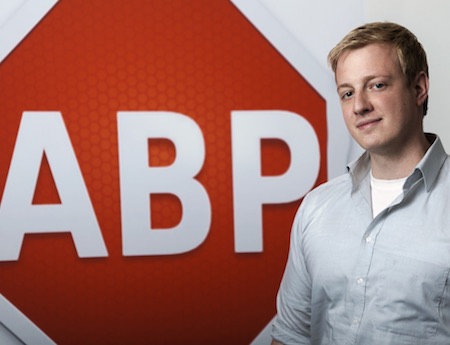Adblock Founder: We Exist Because of the Consumer

The smarter way to stay on top of broadcasting and cable industry. Sign up below
You are now subscribed
Your newsletter sign-up was successful
Speaking at the Disruptive conference event May 9 in New York, Till Faida, founder and CEO of Adblock Plus, was asked a pointed question almost right off the bat: how does the popular ad-blocking company respond to criticism that it’s hypocritical — possibly even an extortionist endeavor — by making money off an industry it helps consumers thwart online?
“It’s of course nonsense. The only reason we exist is because we have millions and millions of users who support our vision and because we provide incremental revenue for our partners,” Faida said. “Of course ad blocking is controversial. I think disruptive technology has to be controversial.”
With the number of downloads of Adblock’s ad-blocking software approaching one billion, and with Adblock Plus currently used on more than 100 million active devices, Faida’s Germany-based company doesn’t look to be going anywhere. And instead of simply helping internet users block ads and calling it a day, the company is actively working with online publishers to show alternative, less intrusive ads, specifically targeted at those who’ve opted out of traditional internet ad experience.
Adblock’s Acceptable Ad program allows ads through its ad-blocking software if they meet certain requirements (covering everything from placement to design), with larger online companies paying Adblock a fee to have their ads shown. “And what we’ve found is that targeted ads provide more value,” Faida said. “The user gets a much better experience, while publishers can make more money and respect consumer choice.”
Faida used his time at the event to stress that Adblock exists because consumers are simply turned off by the online ad experience, “a failed business model” that doesn’t “provide any value to the consumer.”
“Most people who install an ad blocker don’t hate ads, they’re just really annoyed with the intrusive ones,” he said. “If you’re reading an article, and right next to it is an ad that’s screaming for attention, that bothers most people.
“We’re about empowering our users to have control over their browsing experience, and at the same time we’re working with publishers on a user friendly monetization method. You can’t have a business that relies on pissing off its user base.”
The smarter way to stay on top of broadcasting and cable industry. Sign up below
After discussing how Adblock was establishing an independent committee made up of online ad stakeholders — agencies, publishers, ad tech companies, and consumers — to weigh in on the company’s Acceptable Ads program, Faida predicted that the speaker following him — Randall Rothenberg, CEO of the Interactive Advertising Bureau (IAB) — would continue his outspoken criticism of ad-blocking companies.
He wasn’t wrong.
“I have no argument against anyone using ad-blocker[s], I think there is a very strong kernel of truth when it comes to the impedance of their experience,” Rothenberg said. “What I’ve said before … is that this is an extortion-based business and it hurts publishers, primarily small publishers.”
He said the overwhelming amount of revenue earned by publishers worldwide comes from advertising, and for-profit ad blocking companies like Adblock have managed to unfairly divert portions of that revenue “into their own pockets.”
“[Faida] didn’t talk about what’s an acceptable ad, refuses to talk about what the revenues are — they’re very high — and he’s a rich man from blocking advertising,” he said.
